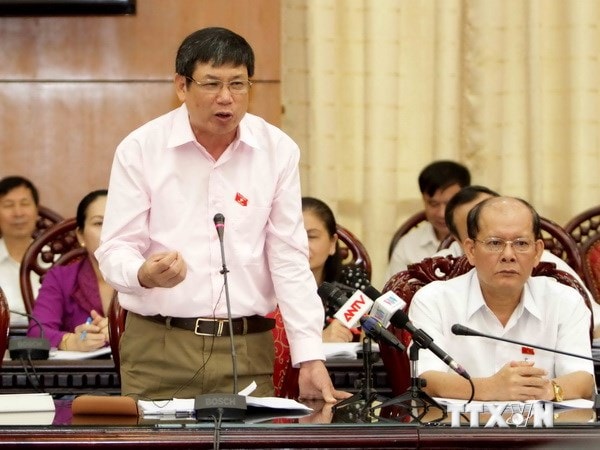National Assembly delegates propose tightening management of public housing
Continuing the conference of full-time National Assembly deputies to discuss a number of draft laws submitted to the National Assembly at the 8th Session of the 13th National Assembly, on the morning of September 10, delegates discussed the Draft Law on Housing (amended).
 |
| National Assembly delegate of Thanh Hoa province Le Nam speaks at the conference. Photo: VNA |
At the conference, delegates agreed with the draft Law stipulating that in the case of buying and selling houses, or renting and purchasing houses, the time of transferring house ownership is from the time the buyer or lessee has fully paid for the house; in the case of buying and selling houses between investors and home buyers, it is from the time the buyer receives the house.
Regarding public housing, according to the National Assembly Standing Committee, there are currently many different opinions. The first type of opinion agrees with the provisions of the draft Law.
The second type of opinion suggests that the public housing regime should only be applied to high-ranking officials who need security protection, and not to other transferred or transferred subjects.
The third type of opinion suggests only investing in building public housing in remote areas, and for officials when they are mobilized or transferred to big cities, the public housing regime should be included in their salaries so they can rent their own housing to avoid waste and dispersion.
Another opinion suggests that the public housing regime be applied to all subjects performing public duties.
The regulation on establishing a public housing fund for those who are mobilized, transferred to work, teachers, doctors... working in remote areas, border areas, islands, areas with particularly difficult socio-economic conditions is extremely necessary to create conditions for these people to work with peace of mind. This is also one of the Party and State's cadre policies being implemented in practice according to the provisions of the current Housing Law.
In that spirit, the National Assembly Standing Committee proposed that in addition to continuing to implement the policy on public housing as in the current Housing Law, it is necessary to clearly stipulate the rights and obligations of officials and civil servants when renting public housing, and at the same time strictly supplement the subjects, management and use of public housing in the draft Law.
Emphasizing the need for public housing, but according to delegate Le Nam (Thanh Hoa), it is necessary to clearly define the subjects who are allowed to live there and the sanctions to avoid situations that have caused negative public opinion like recently; at the same time, create convenience in distribution and use and create conditions for officials to complete their tasks. "This subject must be clearly defined. Officials, but from what level, key officials at the commune, province, district or at what level."
According to delegate Tran Ngoc Vinh (Hai Phong), recently public opinion and voters believe that the management of public housing is still weak, creating many negative public opinions in the media. The draft law is still biased towards those with conditions, while the more disadvantaged groups, especially those with meritorious services, are not clear.
To avoid the current situation of not returning the house when the conditions for staying in public housing are no longer met, delegates said that sanctions for violations and the deadline for repossessing the house (which can be notified six months in advance) must be clearly defined so as not to cause difficulties for the unit as well as the person being mobilized or transferred to receive a new job.
Regarding this content, there are opinions suggesting that the Government should summarize and report to the National Assembly on the current situation of management and use of public housing in recent times so that delegates can clearly understand and have directions to amend the Housing Law accordingly.
Regarding social housing policy, delegates suggested that in addition to specific regulations on incentives for investors building social housing, it is necessary to supplement regulations on incentive mechanisms to encourage investors to build social housing for rent, specifically to be able to borrow preferential capital with lower interest rates and more tax reductions than building social housing for sale or rent-to-own.
The State needs to play a key role in developing social housing, but must ensure that housing is used for the right purposes and avoid taking advantage of preferential mechanisms to gain benefits.
Regarding the Social Housing Development Fund, delegates agreed with the regulations on the establishment of the Social Housing Development Fund, but delegates suggested that it is necessary to specify more clearly the organizational model and operating methods of this state financial institution, especially that the fund should only be established in urban areas with high demand for social housing.
According to Vietnam+






